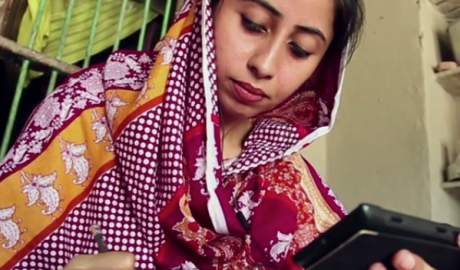Strengthening Teacher Concept Knowledge through Mobile Technology
We are addressing the urgent issue of quality education in Pakistan by providing teachers with access to learning resources delivered via mobile smart phone.
The intervention is based on the premise that teachers who understand subject matter are better equipped to effectively teach those concepts to their students.
The results we’ve seen with our initial group of 200 upper primary teachers have been an exciting: 40% improvement in math and 30% increase in English.
We attribute this success to our localized approach which is informed by 17 years of managing our network of schools and providing teacher professional development across Pakistan. We also credit DIL teachers who have demonstrated a commitment to continuous improvement.
Our localized approach is centered on three features: content development / introducing mobile technology through training and support / and progress monitoring:
DIL curated and created content aligned with Pakistan’s national standards using locally relevant images and examples.“It has changed the way teachers deliver content in the classroom.â€
– Principal in Dir
- We curate and develop concept clarity lessons using the first rule of great teaching: know your students. Our understanding of teachers’ unique instructional needs and their context has enabled us to develop relevant lessons to deepen understanding toward meaningful application.
- We fill a critical gap in access to learning resources by introducing smart phones, training on use as a learning tool, and offer local support to users. The smart phone is our technology of choice because it offers high quality sound and picture offering a quality experience for the user, has a long battery life, and gives teachers control over their own learning – they can pause and repeat as needed and view off-line anytime or place.
- We engage teachers in monitoring their own progress as self-directed learners and collect assessment data in controlled test settings to measure our success.
Results
In addition to meeting and exceeding learning targets, 90% of participating teachers surveyed tell us their teaching has improved as a result of the project.
Principals of participating teachers reported observing higher levels of teacher confidence, school pride, and student engagement as a result of the project. They’ve even noted a spillover effect whereby teachers not participating in the project have also benefitted. Based on this qualitative evidence in conjunction with measurable improvement in teacher subject knowledge, we’re convinced this model can have a meaningful impact on teachers, schools and students at scale.
For this reason we’re planning to double our reach in 2 years and exponentially within 3 years, meeting local demand for more mobile learning.

In their own words:
“Thanks for such helping tool which help us to improve our content knowledge and better learning of students. Specially those children that they cannot afford costly private schools. Insha Allah it will greatly benefit our teachers and consequently our students.â€
“It is very nice, as we do not need to travel outside our community for training, and also we can watch lessons multiple time which is not there in in-person training.â€
Special thanks to our Partners
We extend a special thanks to content partners who contributed use of their material.
- ET4D
- Khan Academy
- Learn Zillion
Thank you also to Papier Mache, who helped us bring the vision for our own lessons to life.
Project Accolades
- Official Clinton Global Initiative Commitment
- Presented at UNESCO Mobile Learning Week 2014 in Paris, France
- Presented at mEducation Alliance Symposium
- Selected as one of five projects worldwide to participate in the 2014-2015 WISE Accelerator Program
This project was made possible with support from the American people delivered through the U.S. Agency for International Development (USAID). The contents are the responsibility of Developments in Literacy (DIL) and do not necessarily reflect the opinion of USAID or the U.S. Government.



